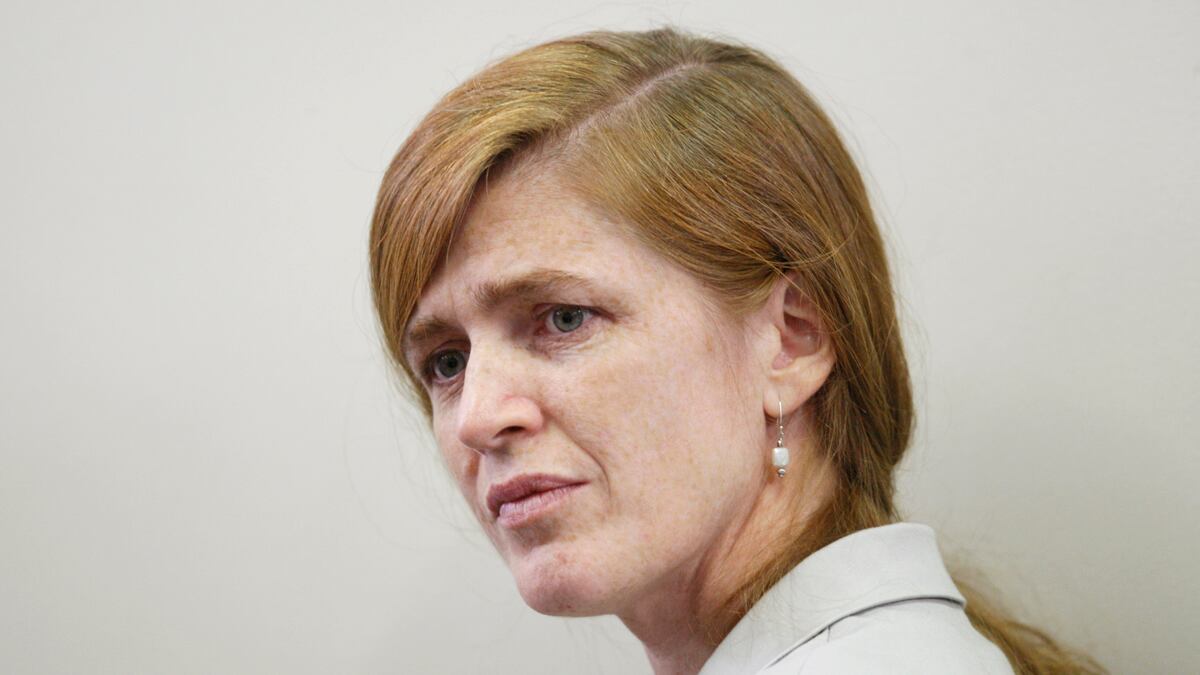Samantha Power seems like an ideal nominee to represent the United States in the United Nations. A Pulitzer-Prize winning Harvard professor, she not only has academic credentials paralleling the greatest U.N. ambassadors, Daniel Patrick Moynihan and Jeane Kirkpatrick, she has their smarts and moxie. Power has crusaded passionately against genocide. She believes American “foreign policy should inject first-order concern for human rights into every policy decision.” And she has blasted Democrats and Republicans cleverly and justifiably, noting that if Bill Clinton “acted as though the United States could do no right with power,” George W. Bush behaved “as though the United States can do no wrong.” But for all the times Power has been right, she has also frequently been wrong, blaming the U.S. and key American allies rather than defending them. During her confirmation hearings senators should see whether an Ambassador Power would defend America—or bash America—when facing the absurd anti-Americanism of the U.N., what has become the Third World Dictators’ Debating Society.

In March, 2003, Power wrote an article in The New Republic putting too much of the blame for anti-Americanism on American foreign policy. Although she admitted that “some anti-Americanism derives simply from our being a colossus that bestrides the earth,” she insisted: “much anti-Americanism derives from the role U.S. political, economic, and military power has played in denying… freedoms to others.” Endorsing a “doctrine of the mea culpa,” she believed that providing “a historical reckoning with crimes committed, sponsored, or permitted by the United States,” would “enhance our credibility by showing that American decision-makers do not endorse the sins of their predecessors.”
This upside-down analysis, treating “much” anti-Americanism as justifiable and only “some” as irrational, puts Power in the “blame America first” camp UN Ambassador Jeane Kirkpatrick mocked in 1984, and that led Barack Obama’s administration to blame the Benghazi attack on an American-produced video rather than on al Qaeda terrorists. It reverses U.N. Ambassador Daniel Patrick Moynihan’s insight in the 1970s, when he refuted the irrational attacks against America and America’s allies, by scrutinizing the “accusers” not the “accused.” Ashard Left ideologues escalated their national self-criticism into collective self-loathing, Moynihan thundered: “It is past time we ceased to apologize for an imperfect democracy. Find its equal.” In 1976, Moynihan became New York’s Senator with the campaign slogan: “This is a society worth defending.”
Like so many radicals, Power is particularly hard on Israel—the American ally most targeted in the U.N. Rejecting the Obama era’s polarized, inflated rhetoric, I would neither call her “anti-Israel” nor an Israel enthusiast. She sympathizes with Palestinians and seems quicker to criticize Israeli self-defense moves than the Palestinian terrorism that triggers them. In 2003, she compared Yasir Arafat to Ariel Sharon. In her moving 2008 book Chasing the Flame, about a murdered U.N. leader, her biased, amoral reading of the Arab-Israeli conflict is particularly surprising for a moralist denouncing genocide. She describes the vicious Palestinian terrorist attacks against Israeli schools and buses in the 1970s, by organizations whose charters called for Israel’s destruction, clinically, writing that by 1978, the PLO "was staging ever-deadlier cross-border attacks from Southern Lebanon into Northern Israel with the aim of forcing Israelis to end the occupation of Palestinian territories.” She characterizes Israel’s first Lebanon war obtusely, writing about “the gnarly issues that had sparked the Israeli invasion in the first place: dispossessed Palestinians and Israeli insecurity,” once again ignoring or soft-pedaling Palestinian violence, no matter how vicious or unrelenting.
Moreover, Power treats Israeli suspicion of the U.N. as an unjustified overreaction to this benign, democratic organization, writing that, “Back in 1975 the Israeli public had turned against the UN when the General Assembly—the U.N. body that gave equal votes to all countries, rich and poor, large and small—had passed a resolution equating Zionism with racism.” By contrast, Ambassador Moynihan denounced that obscene resolution as an “infamous act” and the “Big Red lie,” emphasizing its Soviet origins.
Power has written: “American officials must also understand that their words and tone matter.” The statement applies to her too. She, and the President, must explain whether her appointment reflects a return to Obama’s “apology tours” of 2009. She, and the President, must show they understand that the anti-Americanism shaping Islamist extremist terrorism—and perverting much of the U.N.’s biased debates—“reeks of the totalitarian mind,” as Moynihan said, with its blind willingness to sacrifice truth to serve its absolutist aim. And she needs to affirm that she will defend the United States, Israel, and the West, as eloquently and passionately as she has denounced genocide.





